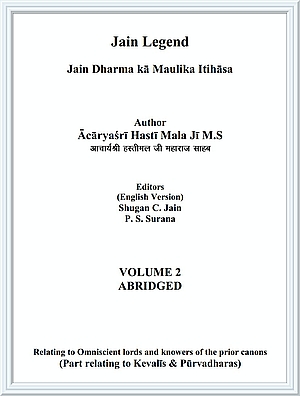The Jain history from 1 to 1000 V.N. has been dealt with, in this book; wherein sincere effort has been made to present the lives of ācāryas, important monks and nuns, significant historical events, royal dynasties and the changes that occurred in them, etc. with substantial evidences. The history of post 1000 V.N. is given in the next volume.
Legendary personality ācārya Hastīmaljī
A great Indian thinker of the era, Śrī Hastīmalajī Mahārāja has remained as a bright star in the family of Nirgrath (passionless) Mokṣa. He was born in the city of Pipad, in Jodhpur district in Rajasthan on 13th January 1911, i.e., VS 1967 Paush Shukla Chaturdasi. Two months before his birth, his father Śrī Kevala Chandjī of Oswal lineage, died due to plague. This was a big jolt like a thunderbolt in a cloudless sky, to his virtuous mother Rupkanvar (Rupadevī). Due to this incident she got aversion towards the world. She brought up her son with a feeling of detachment and taught him the values of righteousness. Within a few years, Hasti's paternal grandparents also passed away.
The aforesaid incidents strengthened the feelings of aversion in Hasti, who was already a born ascetic.
At a tender age of 10 years and 18 days, ascetic Hastīmala accepted monastic life from Ācārya Śrī Shobhachandrajī on Magh Shukla Dvitiya VS 1977 (10th February 1921). Along with him, his mother Rupadevī, and two more people who were aspirants of liberation, took refuge in Jainism. Immediately after joining the Order, Hastīmala started studying the Jain scriptures, oriental languages, philosophy and literature. At the tender age of 15 ½ years, the child monk Hastīmala, who was bestowed with distinct abilities and talent was chosen as the leader of the Jain Order.
In a short span of time, he acquired unparalleled knowledge, combined with meditation. In VS 1987 Vaishakh Shukla (Akshaya Tritiya) at a mere age of 19 years, he was appointed as the seventh Head of Sthanakvasi tradition of Ratna congregation in Jodhpur. He was the only person in Jain history who was made a ācārya at an age of less than 20 years, probably after the omniscient Ācārya Hemachandra of Kalaiyuga.
Ācārya Hastīmala was a persona full of spiritual energy and a multifaceted genius. With appropriate practice (Samayik), he spread the message of equanimity. He also inspired lakhs of people for the study of the scriptures and spread a new enlightenment of amity and knowledge in the society. With indefatigable zeal he strived hard to eliminate profligacy and to root out the evil deeds among mankind, and to encourage women education. Thus he established his name as a social reformer.
An ocean of compassion, Ācārya Hastī, protected & saved all living beings, even poisonous snakes. He not only personally implemented non-violence, forgiveness, equanimity but also demonstrated that the values of life like non-violence, etc preached by Lord Mahāvīra are fully capable of solving the existing problems in society.
Ācārya Hastī, who was an expertise in ancient language and script, was a legend during his life time itself. With untiring hard work and plenty of substantial evidences, he wrote a book named 'Jain Dharma ka Moulik Itihaas' (Original History of Jain Religion), which consists of 3500 pages and is divided into four volumes. This book is an everlasting blessing to Jain religion in particular, and to the Indian society in general. In addition, he even edited and translated the Jain scriptures both in prose and poetry. He wrote poems inspired by the profound feelings of religion, culture and spirituality. He was a skilled and influential religious expounder. His inspirational religious discourses were compiled and published into a book of seven parts, by name 'Gajendra Vyakhyanmala'.
Ācārya Hastī travelled many states like Rajasthan, Delhi, Haryana, Uttar Pradesh, Madhya Pradesh, Gujarat, Maharashtra, Karnataka, Andhra Pradesh, Tamil Nadu, etc and observed altogether 70 Rainy season halt (four month during monsoon) and initiated 85 aspirants of liberation into ascetic life. On 21st April 1991, i.e. VS 2049 Vaisakh (Prathama) Shukla Ashtami, he left his mortal body at 8:21 PM, after observing a fast unto death for 13 days and attained accession to heavenly abode. Just like his birth and life even his final journey too became a legend. His biography was published under the title 'Namo Purisavaragandhahathinam' which approximately consists 900 pages. Now his able disciple, Ācārya Śrī Hirāchandrajī adorns the rank of the eighth successor of Ratna congregation.
 Acharya Hasti Mala
Acharya Hasti Mala
